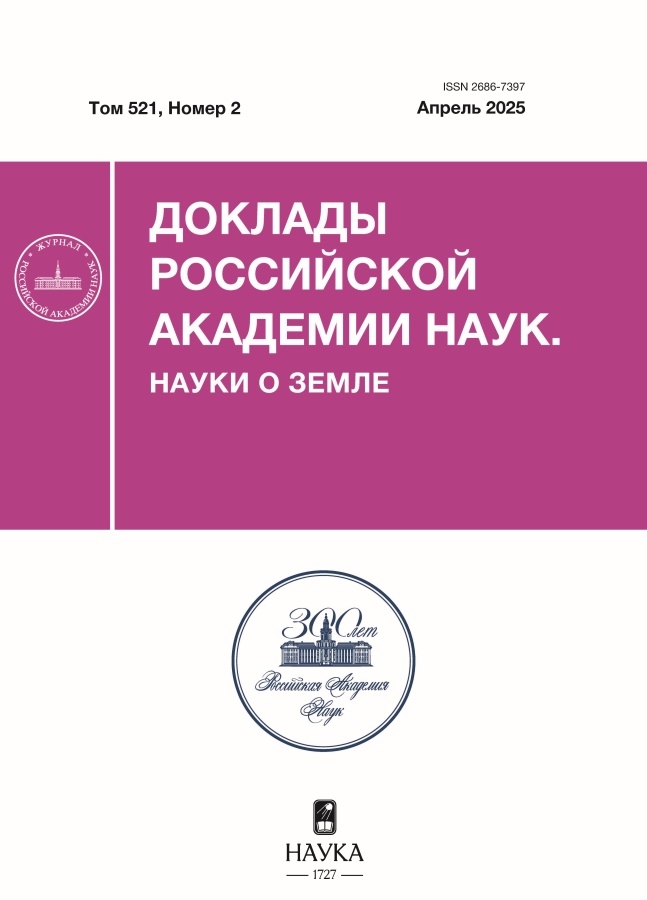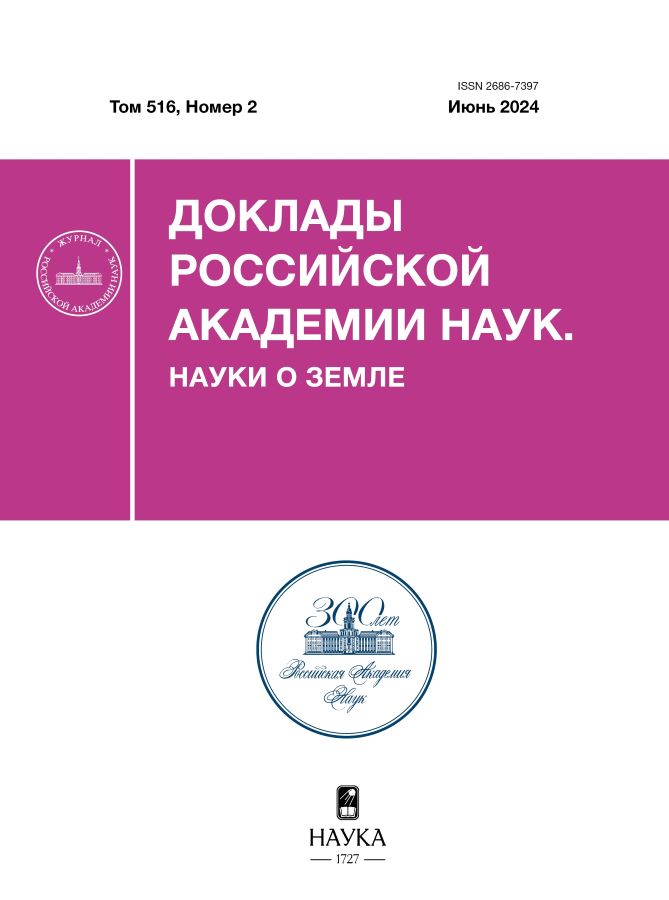Фазовый сдвиг между глобальной приповерхностной температурой и содержанием СО2 в атмосфере по расчётам с ансамблем моделей CMIP6
- Авторы: Мурышев К.Е.1,2, Елисеев А.В.1,2,3,4, Мохов И.И.1,2,5, Тимажев А.В.1, Климович Г.П.1
-
Учреждения:
- Московский государственный университет им. М.В. Ломоносова
- Институт физики атмосферы им. А.М. Обухова Российской Академии наук
- Институт вычислительной математики им. Г.И. Марчука Российской Академии наук
- Казанский федеральный университет
- Московский физико-технический институт (государственный университет)
- Выпуск: Том 516, № 2 (2024)
- Страницы: 632-639
- Раздел: ГЕОФИЗИКА
- Статья получена: 31.01.2025
- Статья опубликована: 12.12.2024
- URL: https://snv63.ru/2686-7397/article/view/650052
- DOI: https://doi.org/10.31857/S2686739724060163
- ID: 650052
Цитировать
Полный текст
Аннотация
Проанализированы фазовые сдвиги между глобальной приповерхностной температурой T и содержанием углекислого газа в атмосфере q, полученных в численных экспериментах с моделями Земной климатической системы проекта CMIP6 (Coupled Models Intercomparison Project, phase 6) для периода 1850‒2014 гг. Получено, что знак фазового сдвига между q и T зависит не только от анализируемого временного интервала, но и от способа обработки исходных рядов. Исходный ряд q (с отфильтрованным годовым ходом) для большинства моделей и временных интервалов опережает по фазе соответствующий ряд T. Первые разности (междумесячные инкременты) для ряда q отстают по фазе от соответствующих первых разностей для ряда T на величину порядка 10 месяцев с адекватным воспроизведением результатов, полученных при анализе данных наблюдений для последних десятилетий. Это означает, что подобное запаздывание не может служить аргументом против общепринятой теории глобального потепления, связывающей современный рост температуры с доминирующим влиянием антропогенных эмиссий парниковых газов в атмосферу.
Полный текст
Об авторах
К. Е. Мурышев
Московский государственный университет им. М.В. Ломоносова; Институт физики атмосферы им. А.М. Обухова Российской Академии наук
Автор, ответственный за переписку.
Email: kmuryshev@mail.ru
Россия, Москва; Москва
А. В. Елисеев
Московский государственный университет им. М.В. Ломоносова; Институт физики атмосферы им. А.М. Обухова Российской Академии наук; Институт вычислительной математики им. Г.И. Марчука Российской Академии наук; Казанский федеральный университет
Email: kmuryshev@mail.ru
Россия, Москва; Москва; Москва; Казань
И. И. Мохов
Московский государственный университет им. М.В. Ломоносова; Институт физики атмосферы им. А.М. Обухова Российской Академии наук; Московский физико-технический институт (государственный университет)
Email: kmuryshev@mail.ru
академик РАН
Россия, Москва; Москва; ДолгопрудныйА. В. Тимажев
Московский государственный университет им. М.В. Ломоносова
Email: kmuryshev@mail.ru
Россия, Москва
Г. П. Климович
Московский государственный университет им. М.В. Ломоносова
Email: kmuryshev@mail.ru
Россия, Москва
Список литературы
- Climate Change 2021: The Physical Science Basis. Working Group I contribution to the Sixth Assessment Report of the Intergovernmental Panel on Climate Change / V. Masson-Delmotte et al. (ed.). Cambridge Univ. Press., 2021. 2406 p.
- Humlum O., Stordahl K., Solheim J. E. The phase relation between atmospheric carbon dioxide and global temperature // Global and Planetary Change. 2013. V. 100. P. 51–69.
- Cox P., Jones C. Illuminating the Modern Dance of Climate and // Science. 2008. V. 321. № 5896. P. 1642–1644.
- Monnin E., Indermohle A., Dallenbach A., Flockiger J., Stauffer B., Stocker T., Raynaud D., Barnola J.M. Atmospheric concentrations over the last glacial termination // Science. 2001. V. 291. № 5501. P. 112–114.
- Мохов И.И., Безверхний В.А., Карпенко А.А. Диагностика взаимных изменений содержания парниковых газов и температурного режима атмосферы по палеореконструкциям для антарктической станции Восток // Изв. РAH. Физика aтмocфepы и oкeaнa. 2005. Т. 41. № 5. С. 579–592.
- Мохов И.И. Взаимные изменения температуры и содержания аэрозоля в атмосфере по данным антарктических ледовых кернов для последних 800 тысяч лет // Вестник Московского университета. Серия 3. Физика. Астрономия. 2023. Т. 78. № 3. 2330903.
- Мурышев К.Е., Елисеев А.В., Мохов И.И., Тимажев А.В. Взаимное запаздывание между изменениями температуры и содержания углекислого газа в атмосфере в простой совместной модели климата и углеродного цикла // ДАН. 2015. Т. 463. № 6. С. 708–712.
- Мурышев К.Е., Тимажев А.В., Дембицкая М.В. Взаимное запаздывание между изменениями глобальной температуры и содержания углекислого газа в атмосфере при непарниковом внешнем воздействии на климатическую систему // Фундаментальная и прикладная климатология. 2017. № 3. С. 84–102.
- Muryshev K.E., Eliseev A.V., Mokhov I.I., Timazhev A.V. Lead-lag relationships between global mean temperature and the atmospheric content in dependence of the type and time scale of the forcing // Global and Planetary Change. 2017. V. 148. P. 29–41.
- Мурышев К.Е., Елисеев А.В., Денисов С.Н., Мохов И.И., Тимажев А.В., Аржанов М.М. Фазовый сдвиг между изменениями глобальной температуры и содержания СО2 в атмосфере при внешних эмиссиях парниковых газов в атмосферу // Изв. РАН. Физика атмосферы и океана. 2019. Т. 55. № 3. С. 11–19.
- Мурышев К.Е., Елисеев А.В., Мохов И.И., Тимажев А.В., Аржанов М.М., Денисов С.Н. Влияние нелинейных процессов на временной лаг между изменениями глобальной температуры и содержания углекислого газа в атмосфере // Доклады АН. 2021. Т. 501. № 1. С. 62–68.
- Ganopolski A., Roche D. On the nature of lead-lag relationships during glacial-interglacial climate transitions // Quaternary Science Reviews. 2009. V. 28. P. 3337–3361.
- Cox P.M., Betts R.A., Jones C.D., Spall S.A., Totterdell I.J. Acceleration of global warming due to carbon-cycle feedbacks in a coupled climate model // Nature. 2000. V. 408. № 6809. Р. 184–187
- Dufresne J.-L., Friedlingstein P., Berthelot M., Bopp L., Ciais P., Fairhead L., Le Treut H., Monfray P. On the magnitude of positive feedback between future climate change and the carbon cycle. // Geophys. Res. Lett. 2002. V. 29. № 10. 1405.
- Елисеев А. В., Мохов И. И., Карпенко А. А. Вариации климата и углеродного цикла в XX-XXI веках в модели промежуточной сложности // Изв. РАН. Физика атмосферы и океана. 2007. T. 43. № 1. С. 3–17.
- Eliseev A. V., Mokhov I. I. Carbon cycle-climate feedback sensitivity to parameter changes of a zero-dimensional terrestrial carbon cycle scheme in a climate model of intermediate complexity // Theor. Appl. Climatol. 2007. V. 89. № 1–2. P. 9–24.
- Мохов И. И., Елисеев А. В. Моделирование глобальных климатических изменений в XX–XXIII веках при новых сценариях антропогенных воздействий RCP // ДАН. 2012. Т. 443. № 6. С. 732–736.
- Оппенгейм А., Шафер Р. Цифровая обработка сигналов. М.: Техносфера, 2006. 856 с.
- Arora V. K., Katavouta A., Williams R. G., Jones C. D., Brovkin V., Friedlingstein P., Schwinger J., Bopp L., Boucher O., Cadule P., Chamberlain M. A., Christian J. R., Delire C., Fisher R. A., Hajima T., Ilyina T., Joetzjer E., Kawamiya M., Koven C. D., Krasting J. P., Law R. M., Lawrence D. M., Lenton A., Lindsay K., Pongratz J., Raddatz T., Sèfèrian R., Tachiiri K., Tjiputra J. F., Wiltshire A., Wu T., Ziehn T. Carbon-concentration and carbon-climate feedbacks in CMIP6 models and their comparison to CMIP5 models // Biogeosciences. 2020. V. 17. № 16. P. 4173–4222.
- Елисеев А. В. Глобальный цикл : основные процессы и взаимодействие с климатом // Фундаментальная и прикладная климатология. 2017. Т. 4. С. 9–31.
Дополнительные файлы















